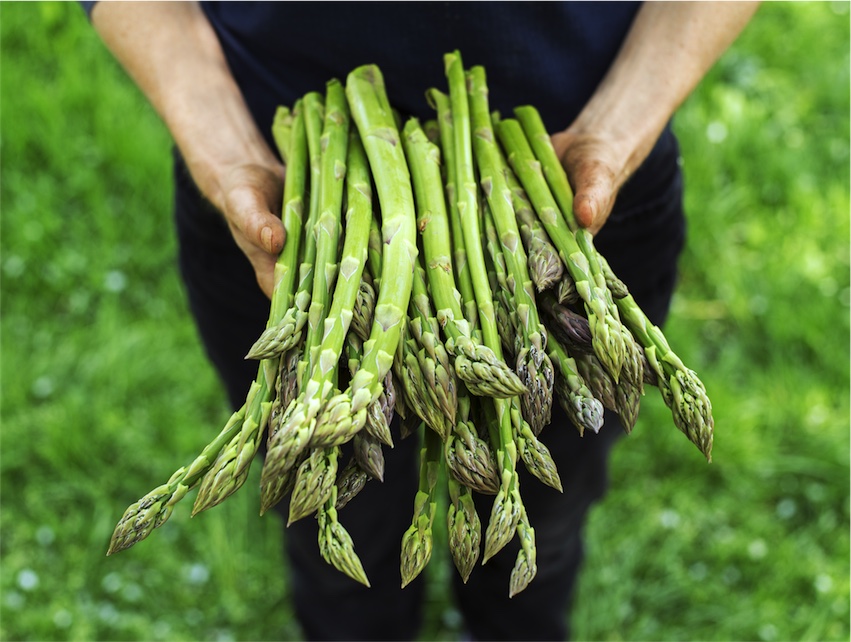Let’s hear a cheer for the spear! One of the delights of heading into spring is the appearance of asparagus at the local produce market. The Australian season lasts from September –March but the prime time for asparagus is considered September –December.
Health benefits of asparagus
Asparagus has a low glycaemic index making it an ideal inclusion in anti-inflammatory diets to manage diabetes, high blood pressure, acne and PCOS. Animal studies have shown compounds in asparagus may improve the function of the cells that produce insulin.
Inulin, a soluble fibre makes up around 10-15% of asparagus. The pre-biotic properties of inulin help support healthy gut bugs which in turn create help with things like SIBO, IBS, mood disorders and weight loss.
Asparagus is rare among vegetables in that it contains bioavailable pre-formed glutathione. Glutathione is a master antioxidant and keeps inflammation in check.
One cup of cooked asparagus contains 100% of your daily recommended intake of Vitamin K. It’s an excellent source of folate, copper, B1, B2, Vitamin C and E. Although it’s not ‘leafy” you could include asparagus as one of your two daily serves of leafy greens.
How to select and store asparagus
Fresh is best when it comes to asparagus. Look for firm, bright, thin stems with closed tips and the cut ends should not be too woody.
Try and use asparagus within 48 hours. Keep in your vegetable crisper and preserve freshness by wrapping the top in a damp towel.
How to cook
Asparagus is a versatile vegetable. You can sauté, steam, blanch or roast it. Before cooking it, trim off the woody ends by bending the lower third until they snap. Discard the lower end as this will be tough and woody.
In terms of cooking time, to preserve the most nutrients less is best. If roasting add them in the final five-seven minutes and if using in salads a one-minute blanching gives good results and leaves them a little bit crunchy.
What’s the deal with asparagus urine?
It wouldn’t be an asparagus article without answering the question about asparagus pee. The distinct smell that appears in the urine after you consume asparagus.
Most people will get asparagus urine, but not everyone can smell it. Scientifically speaking the odour is due to the phytonutrient, asparagusic acid which has very reactive sulphur atoms which break down after digestion and create “Eau de Asparagus”. The differences in intensity, timing and amount of smell are due to individual variances in digestion, absorption and metabolism.
It’s thought that asparagusic acid is involved in the production of a significant antioxidant – alpha-lipoic acid. Asparagus pee is a no cause for concern despite some of the things you might read about it.
Asparagus healthy recipe inspiration
Asparagus is delicious in pasta, omelettes, salads and soups. Lemon, garlic and extra virgin olive oil are all good mates with asparagus and will make those spears sing!
I’ve compiled 5 tasty recipes to give you plenty of inspiration for your asparagus feasts.
- Chickpea Omelette with asparagus
- Roasted garlic and asparagus soup
- Strawberry asparagus salad with tahini dressing
- Lemon pepper asparagus
- Citrusy asparagus
Got a favourite asparagus recipe? I’d love to hear about it. Leave me a comment below.
If you enjoyed this you might also like:
High blood pressure? You need to be eating these four foods.

Need help with your nutrition and healthy eating goals?
Norelle Hentschel is an experienced Naturopath with a clinic in Stones Corner, South East Brisbane and also offers Telehealth consults Australia wide. She enjoys supporting her clients to reach their health goals.
Want more articles like this?
Receive a monthly digest of natural health information to help you become “health” sufficient!
PS. Your inbox real estate is precious, and we will never annoy you with sales pitches or share your details with anyone else. One email a month — that’s it.


